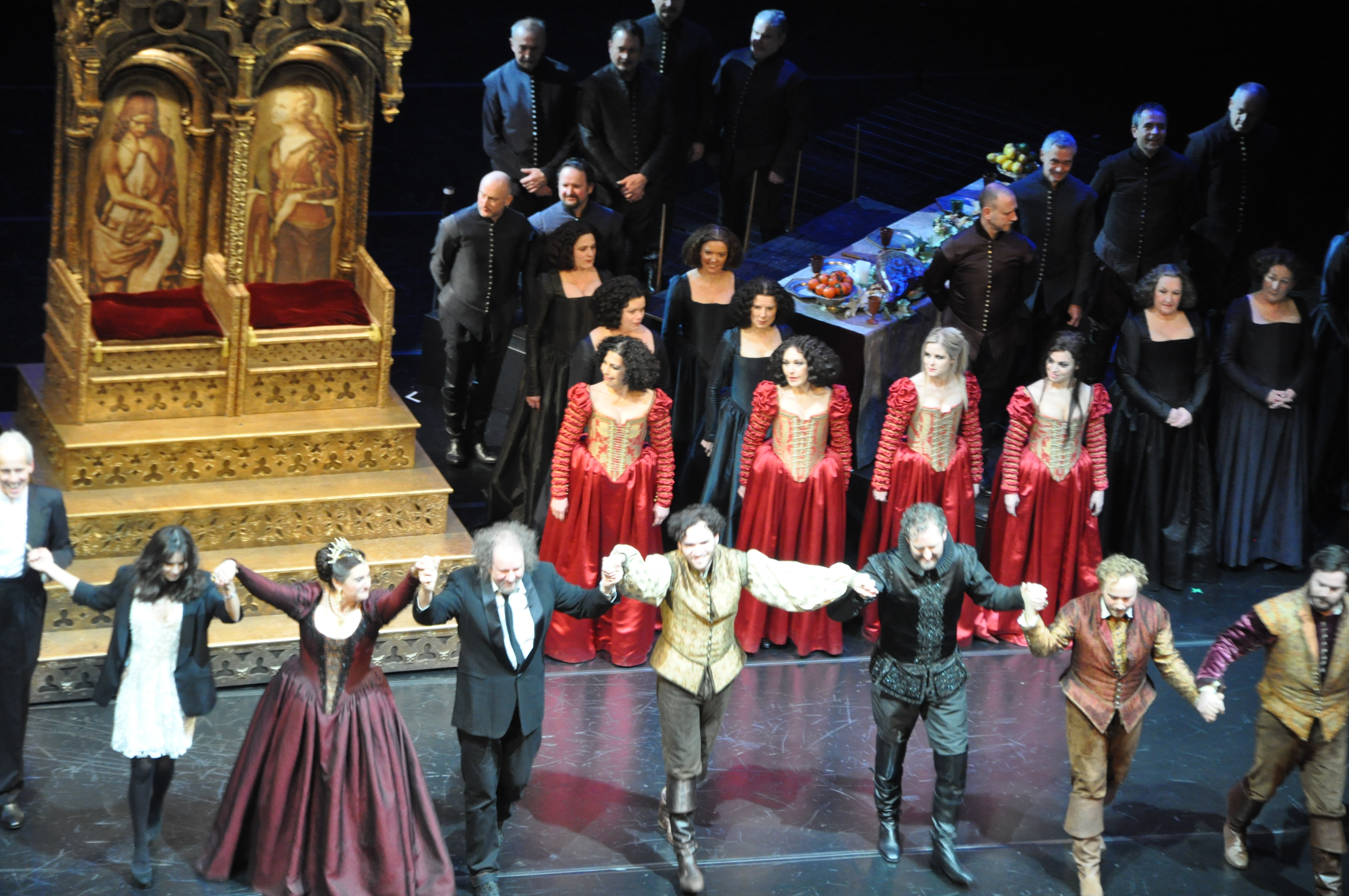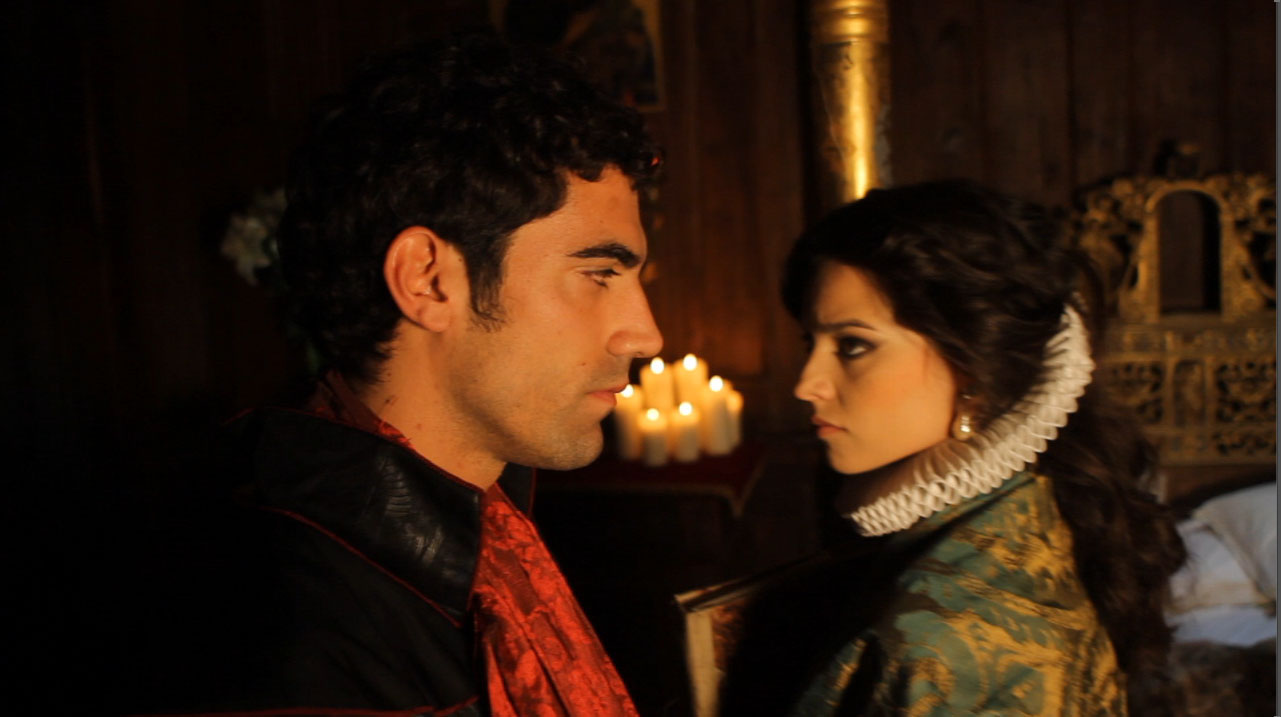
Lucrezia Borgia Film, Credit Mike Figgis, Courtesy ENO
I was late arriving at Groucho's and Mike Figgis was already anxious. It was the day after his opera Lucrezia Borgia had premiered with English National Opera in the gloriously ornate London Coliseum. The ENO had been adventurously pairing auteurs in new productions, and Figgis, known for such films as 'Leaving Las Vegas' (1995), 'Timecode' (2000), and Internal Affairs, had taken on the challenge of directing Donizetti's rarely performed 1833 opera sung in the bel canto style.
The reviews that morning had been mixed as was to be expected when innovators are pitted against traditionalists, but over coffee we digressed and chatted about his early roots in music, (he is an excellent trumpet player), his Hollywood encounters, Christopher Hitchens, and Renaissance porn...
Lucrezia Borgia performance with Mike Figgis at ENO-© Kisa Lala
Though the opera itself is more about music than logic, Figgis weaves in cinematic vignettes to create a cohesive background story, which makes the opera accessible to first-timers but also updates a languishing genre by bridging to a contemporary audience used to the language of cinema. The films, with Katy Saunders playing Ms. Borgia, were shot on a small budget outside Rome in three days. The opera is an oedipal tale of dark secrets, power and corruption in one of Italy's most powerful families - Lucrezia was a pawn in the political maneuverings between her jealous brother Cesare, and their father Pope Alexander VI. Her second marriage was voided so she could marry a third man, Duke Alfonso, by declaring herself still a virgin, (vagina intacta) while she was three months pregnant.
I mentioned to Figgis that I had been sitting between members of the Donizetti Society the previous night, and though they had been in the minority, some had made their displeasure known.
MF: It was a fair representation of the opera world anyway. If you look at the age range of those attending they seemed to be white middle class and tend to be older. They're always going to see opera.
KL: You are challenging an audience with established tastes. Did you have any intention of deliberately provoking a change?
MF: If I do a project, I want to learn something, be challenged. I was thinking of it on the way here, I wanted to direct the opera so they could clearly hear the singers; the music was center stage. Then, having first worked out the basic requirements of how to stage an opera - what could I add to that? What could I bring to freshen it up? It doesn't really come from the idea of you must break ground - I love art and I love the expression of art, and how do I make it fresh? It's not about punching holes in the establishment - it always comes from a good place in the heart. If I was in the audience what would I enjoy on top of the normal menu?
KL: Why did you choose Lucrezia Borgia in particular?
MF: When you come into do an opera, they already have some idea of what they want to do on the back burner. During my initial conversation they made the assumption that I want to do something avant-garde. So-called... It's funny when they talk about the avant-garde, there's a great quote from Duke Ellington. When somebody asked him about the avant-garde, he said, really, do we have to go that far back? It's a twentieth century idea the avant-garde. I didn't want to do an intellectually challenging piece of music that was an academic statement. I wanted to do a quite tuneful opera with arias...
KL: Well, it was beautiful music. The ending was especially riveting, and I am a layperson when it comes to opera.
MF: The ending is what drew me to it. It's actually a piece of pop music. If you're making more of a mainstream film, you know that if the last ten minutes doesn't pay off, you're really going to have to struggle. Sometimes they say, oh well you can fix the ending later but you know you never can...This has a very beautiful poignant ending.
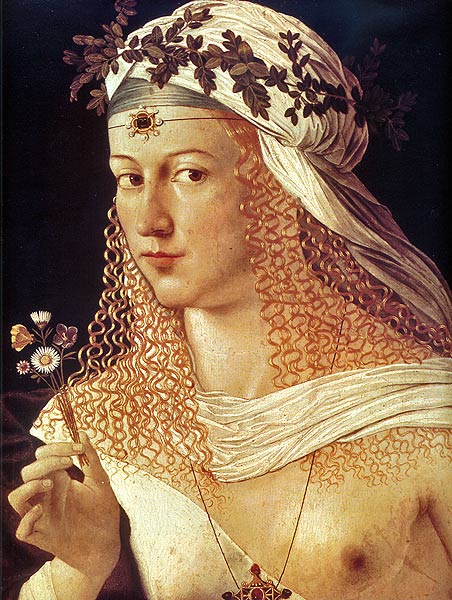
Alleged portrait of Lucrezia Borgia, Oil on canvas, 16th century; location: Städelsches Kunstinstitut
KL: Lucrezia Borgia is also a complicated character. Do you feel the opera was written to show a sympathetic side to her?
MF: The truth about LB is she is an incredible woman. Whored out by both her father and brother. And literally abused sexually by them, and whored out to three husbands. Through serendipitous good fortune, the third husband was quite a good guy, and once she broke out of the hold of her father and brother, she became an incredibly good stateswoman. As soon as she got away from them at the age of twenty-one, and away from Rome's power base, she and Alfonso were benevolent, great friends of the arts. They were racially very liberal, one of the few places that tolerated Jews and worked with the community, and an incredible healer of other people's wounds.
So the opera is complete fiction. They call her the whore from hell...it's based on a Victor Hugo novel and it was a complete fabrication.
I got most of my material from a great biography of Lucrezia by Sarah Bradford. I took a little bit of license with some of the characters, but it's pretty much based on the information in that book, and then I read a lot of other books too and became very fond of her as a character. I thought it would be great to do a real opera about Lucrezia that told the truth - but in a way the film does that.
KL: The incestuous aspects to the background story - you tell it through the film.
MF: What's interesting is that - no one really knows... She married at thirteen. Dissolved the marriage, and faked the reason which was non-consummation... The second husband was killed by her brother, strangled in her own bed, which I turned out into the story of Calderon. [In the film, Pantesilia the handmaid, and her lover Calderon] were murdered by Cesare because he believed Lucrezia was having an affair with Calderon. Then Lucrezia had a child and no one really knew who the father was - the child died in childbirth. And at exactly the same time another child mysteriously appeared in the Borgia household and finally, the father was given to be the Pope. One of the theories for the Gennaro character was, like Chinatown, the father and the grandfather was one and the same. Which I don't hammer home but it's there...
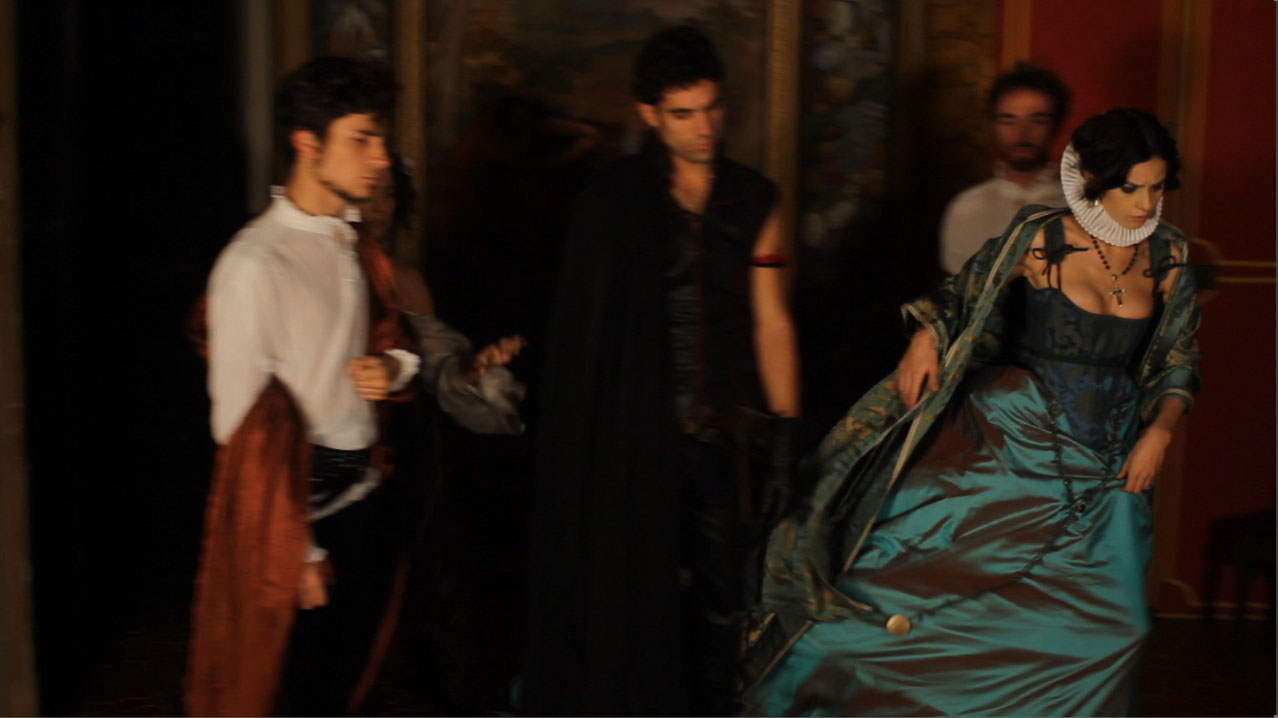
Lucrezia Borgia Film Clip 9 Credit Mike Figgis, Courtesy ENO
KL: Is it a different experience to perform for such a large, live audience?
MF: No, my roots are very much live performance, I had a theater company for five years, and I was in a traveling theater company for ten years, and I was an actor at that point, and a musician. Before I did film, I did nothing but live theater.
KL: The film vignettes referenced the culture of the times - were you using them to structure the performance as a way of supporting the whole?
MF: Way back, when I was in Hollywood and very depressed. I was always plotting alternative projects. I wanted to do a really big portrait of the 20th century, through artists and musicians: Folk singers and jazz musicians like Charlie Parker, Bud Powell, and Miles - because they went to Paris and they met existentialists and filmmakers and so on. History tends to compartmentalize everything, and they don't take into account that artists talk to other artists all the time. If you read Dylan's book, for example, in the 50s and 60s New York, he talks about hanging out with Ornette Coleman and Lord Buckley and I know from my own experience, I talk to painters and all kinds of people. We've got so used to the idea of this simplistic, linear narrative where everything is plot-based, plot-heavy, but actually, our lives are always about the texture that surrounds us.
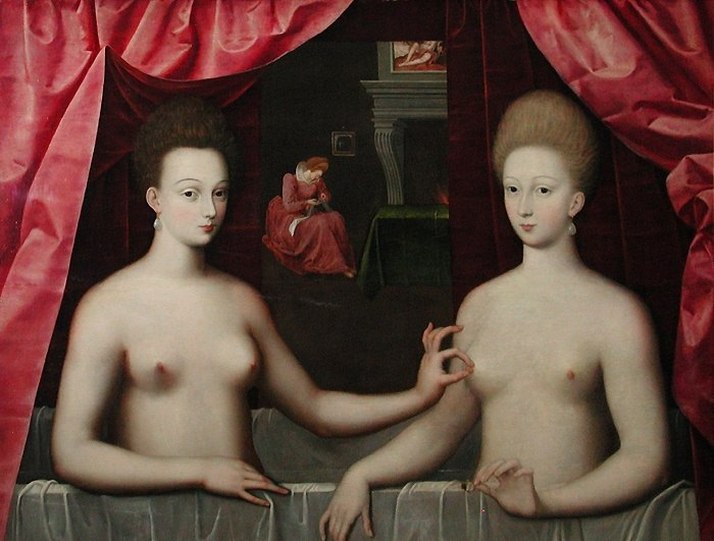
Left: Painting allegedly depicting Gabrielle d'Estrees, Courtesy of the Louvre
MF: When I did research for the opera I googled Renaissance porn, and came up with beautiful paintings. I wanted to recreate 5 or 6 of these paintings. I wanted to use these references, and discovered they were very rich. Like the pinching of the nipple [Painting of Gabrielle d'Estrees] is to designate illegitimate pregnancy and so on.
KL: What are some others?
MF: The Bearded Woman Breastfeeding [Ribera's 1631.] There's another one of a saintly woman on a pedestal, lactating, with a man there kneeling, drinking her milk. There's various other ones which are quite brutal. A lot of rape images...I wanted to get in as many textural parallel images - rather than direct plot points.
KL: The film portions were so painterly. The women were glowing.
MF: They were all lit with one light source, like in chiaroscuro - the light was from the window: daylight, more or less. And in the night scenes, I obviously used a light source. I've been referencing Leonardo's notebooks.
KL: Did you see Peter Greenaway's Last Supper at the Armory? Are you at all inspired by formalist filmmakers like Michael Snow?
MF: Greenaway - I know that he has been obsessing about the interior life of these paintings. But no, I've tended to follow the advise of Charles Ives -when he was asked, Charles, Do you go and see a lot of work, do you get out much? He said, 'you know what, I just find it terribly confusing because either, they are doing quite like what I'm doing, and I get really insecure or I just don't understand what's going on and it slows me up, and I just get on with it.'
Obviously, you can't avoid images coming in all the time. I love the internet, I love Renaissance porn... I find the influences are far more significant from random sources, rather than other people's works...I love and revisit Godard...and that period of cinema, which I think is really rich. The power of Godard in the way he uses, disparate images and text - I still found that very, very cutting edge.
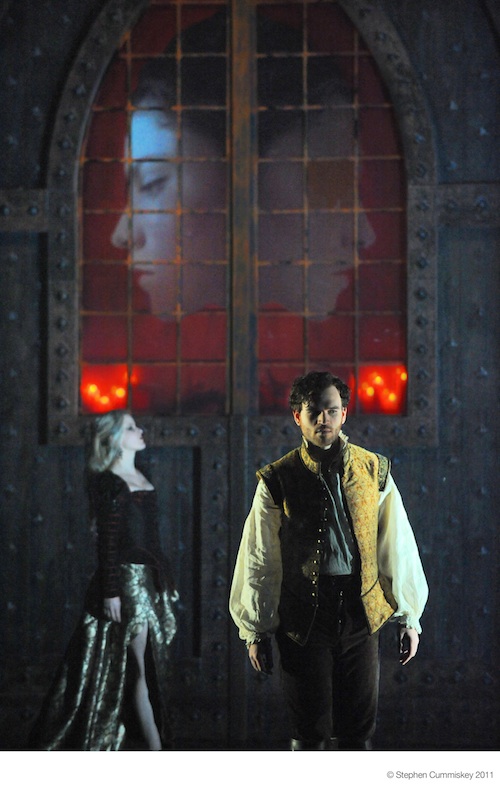
Lucrezia Borgia performance production at ENO -Michael Fabiano, photo: Stephen Cummisky
KL: You never went to film school. But then you have this sort of mathematical, musical brain. I understand that it affects your memory in a certain way...
MF: I studied music for three years. I was terrible at math. But I admired the pure maths brain. With music there was this initial seduction, whereas with maths you don't have the emotional connection to the heart in such an obvious way. My father, who was an amateur pianist, from a very early age taught me to listen to drummers and bass players....he'd say listen to what the bass player is doing in jazz - because he's actually holding the whole thing together. You can't hear him, and that's why he's brilliant. The drummer is doing something very subtle - he's not showing off - it's the idea of a rhythmic catalyst.
KL: Do you have an underlying score you play off of?
MF: I took the libretto and retyped it into a final draft, and turned into a film script. It's a convenient way of seeing the text in familiar way, and it gave me an understanding of the story. And I started adding to that, descriptions of scenarios.
[note: Figgis moved LB's entrance up to the beginning; she appears in the second scene in the original version] I thought this is in the wrong place, the opera is supposed to start with a big overture...so I reversed it. And that caused a few gasps. And I am sure the Donizetti Society were all basically peeing themselves at that point.
One of the operas they offered me, which was very interesting, was Einstein on the Beach. By a complete fluke I went to a Philip Glass recital and sat opposite Philip a week later, and told him we were discussing this at ENO, and he said, 'Oh that would be great, you can start from scratch.' But he co-owns it with Robert Wilson, and Robert said, no.
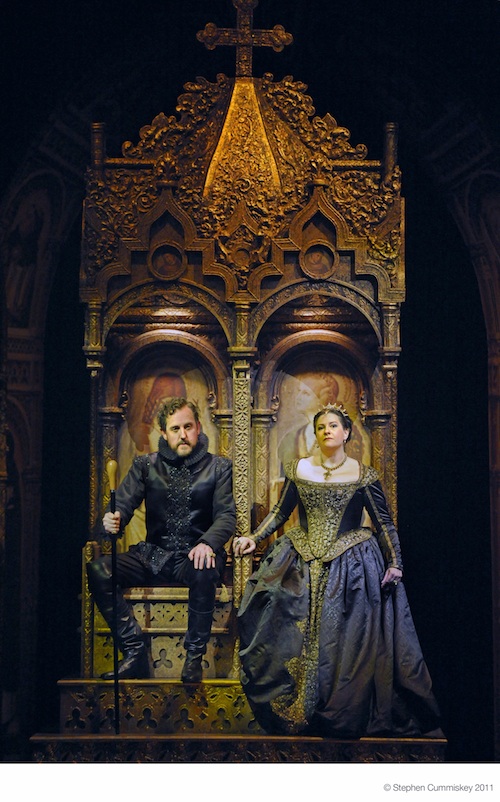
Lucrezia Borgia, Claire Rutter, Alastair Miles photo: Stephen Cummisky, Courtesy ENO
KL: And so you ended up doing LB. One of my favourite films of yours is Loss of Sexual Innocence. Just the contradictions in selfishness and love - I found that was present in LB as well. She is a survivor.
MF: Mine too. In the original opera she is supposed to swoon into the arms of a handmaiden after the final aria. And I went, no, you're strong, and life will go on for another ten years for you - she actually died in childbirth.
KL: Renaissance woman in recorded history are either saints or whores.
MF: They are either on or off the pedestal. And if they are on the pedestal they are somehow non-sexual and if they are sexual, they are whores. This goes from deeply rooted historical terror of the female power from men.
Did you hear the BBC debate between Christopher Hitchens and Tony Blair? Hitchens is dying so he doesn't give a damn. And he absolutely wiped the floor. And the debate was, 'Is religion in anyway valid any more?' His whole point was that all religion's been so anti-female across the board - from the beginning - and for that reason it's not valid. And it's something we should be moving from. And Tony Blair was trying to defend Catholicism, and he didn't have a leg to stand on.
KL: Ever you read that essay by Hitchens on why women aren't funny. I think his point was they don't have to prove themselves in that way the same way men do.
MF: I did a book called Hollywood conversation and interviewed Mel Gibson, why do you think there are so few good parts for women in the film industry and he looked at me like I was insane and when I repeated the question, he said have you ever heard a woman tell a joke? Sometimes the questions come from the right place but are the wrong questions. Do women feel the need to be funny, the way men do - and this has to do with male and female bonding. Actually women are hysterically funny among women when they are talking about men. But [do they really want to go to] Comedy Central and want to be a geezer... So, it's staged in the wrong way that question.
KL: So what's next?
MF: In September, [at the Royal Opera House], the Deloitte bankers sponsor the first weekend to kick-start the fall season, and I am the curator for a series of provocative talks that I am calling, 'Tell the Truth'. Tell the truth about fashion... tell the truth... about everything...
ENO and Sky are livecasting Lucrezia Borgia for the first ever live opera in 3D on 23 February 2011 on cable and selected cinemas in 3D around the UK and in 2D in selected cinemas internationally.
For more information see ENO
Text: www.kisalala.com

